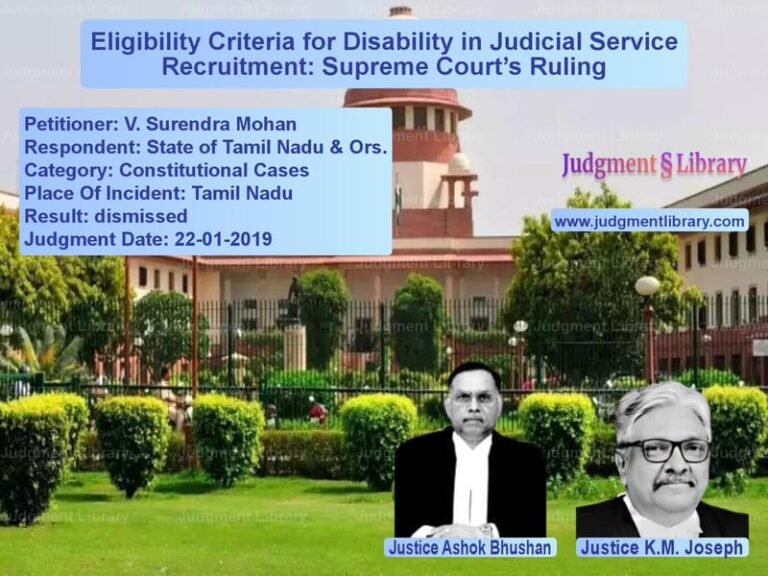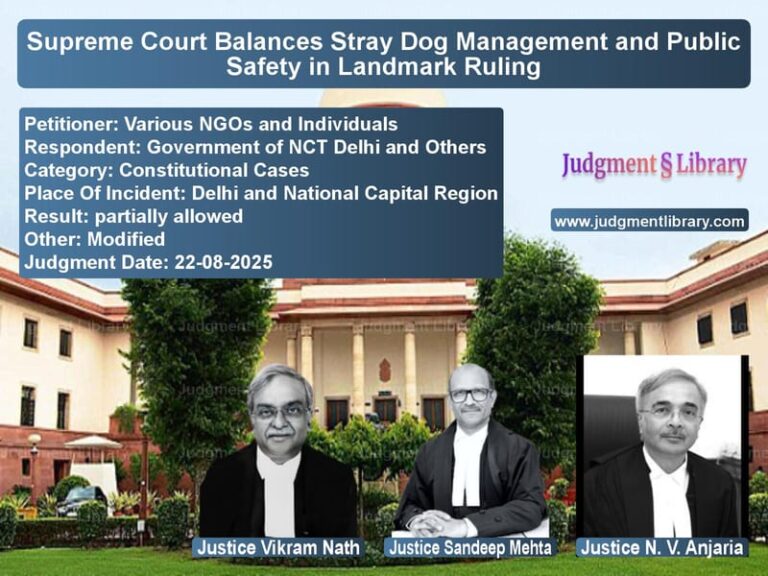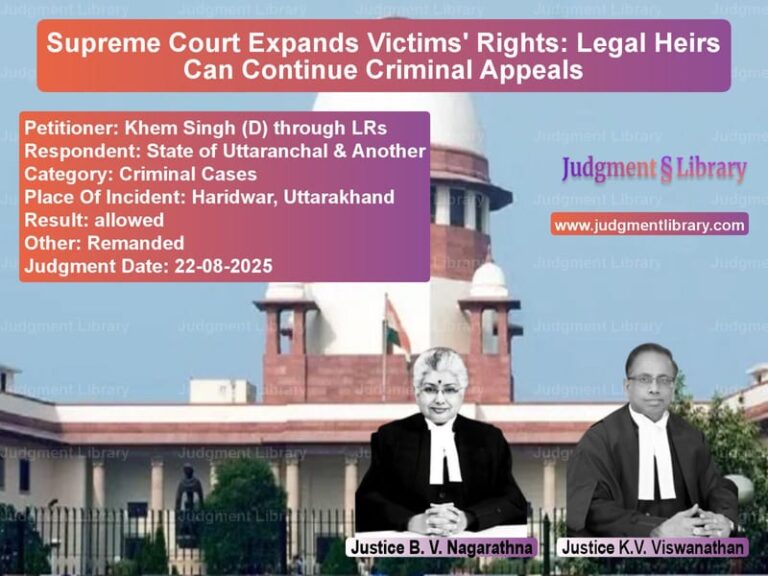Kolkata Municipal Corporation’s Water Usage Notice Quashed by Supreme Court
The case of Trust Estate Khimji Keshawji & Anr. v. Kolkata Municipal Corporation & Others revolves around a dispute over the usage of municipal water for non-domestic purposes. The Supreme Court quashed the Kolkata Municipal Corporation’s (KMC) notice, ruling that the statutory framework permitted such usage in the absence of unfiltered water supply.
Background of the Case
The case arose from a notice issued on August 22, 2008, by the KMC under Sections 238 and 271 of the Kolkata Municipal Corporation Act, 1980. The notice accused the appellant of using water supplied for domestic purposes for commercial activities in their building at 30, C.R. Avenue, Kolkata, warning of prosecution and disconnection.
Key Developments Leading to Litigation
- 2008: KMC issued a notice alleging violation of water usage rules.
- 2008: The appellant filed a writ petition before the Calcutta High Court.
- 2012: A single-judge bench dismissed the writ, upholding KMC’s notice.
- 2019: A Division Bench affirmed the single-judge ruling.
- 2023: The Supreme Court ruled in favor of the appellant, quashing KMC’s notice.
Arguments Before the Supreme Court
Appellant’s Arguments
The appellants, represented by their legal counsel, argued:
- The notice was non-specific and vague, failing to provide details of the alleged violations.
- KMC had issued trade licenses to various commercial tenants in the building, acknowledging non-domestic usage.
- Unfiltered water was not available in the area, making filtered water the only option for all purposes.
- KMC had imposed water charges under Section 238(2), effectively permitting non-domestic usage.
- Under Section 272(4), wholesome water could be used for non-domestic purposes in the absence of unfiltered water.
Respondent’s Arguments (Kolkata Municipal Corporation)
KMC defended its notice, arguing that:
- The appellants had failed to seek formal permission under Section 239 for non-domestic water usage.
- Filtered water was intended only for residential use, and its usage for business activities violated regulations.
- The High Court had correctly upheld the notice, allowing the appellant to apply for permission.
Supreme Court’s Analysis and Judgment
A bench comprising Justices B.R. Gavai and Vikram Nath ruled in favor of the appellants, citing multiple legal deficiencies in KMC’s notice.
Key Observations of the Court
1. The Notice Was Vague and Unenforceable
“The impugned notice does not mention any reason or specific violation committed by the appellant. It is a general and vague notice to which apparently no answer/explanation could be given.”
The Court held that a legally valid notice must clearly specify the nature of the violation.
2. KMC Had Already Recognized Commercial Water Use
“KMC issued trade licenses with explicit mention of water charges under Section 238(2), which permitted non-domestic water use.”
The Court found that KMC’s actions contradicted its claim that non-domestic water use was illegal.
3. Section 272(4) Overrides Other Provisions
“Wholesome water may be used in lieu of unfiltered water for non-domestic purposes where the supply of unfiltered water is not available.”
The Court ruled that Section 272(4) permits non-domestic use when unfiltered water is unavailable, rendering the notice invalid.
4. Occupiers Were Not Notified, Violating Legal Norms
“The Corporation was aware of the occupiers of the building but did not issue notices to them, making the proceedings against the owner legally untenable.”
The Court noted that under Section 275(1)(c), action should be taken against the occupiers rather than the owner.
5. The High Court Erred in Its Interpretation
“The non-obstante clause in Section 272(4) of the Act would have overriding effect over Sections 238 and 271.”
The Supreme Court ruled that the High Court misapplied the law by not recognizing the superior legal authority of Section 272(4).
Final Ruling
The Supreme Court quashed KMC’s notice, stating:
“The impugned judgment and orders passed by the Division Bench of the High Court and the learned Single Judge are set aside. The writ petition succeeds and is allowed.”
The Court granted KMC the liberty to issue fresh proceedings if legally justified.
Impact of the Judgment
This ruling has significant implications for municipal regulations:
- Strengthens due process requirements: Authorities must issue specific and clear notices.
- Protects commercial water users: Businesses cannot be arbitrarily penalized when unfiltered water is unavailable.
- Reinforces property rights: Owners cannot be held accountable for tenants’ usage without direct notification.
- Limits municipal overreach: Ensures fair enforcement of water regulations.
Conclusion
The Supreme Court’s decision in Trust Estate Khimji Keshawji v. Kolkata Municipal Corporation sets a crucial precedent on water usage regulations. By upholding Section 272(4), the ruling affirms that when unfiltered water is unavailable, wholesome water can be legally used for commercial purposes. The judgment strengthens due process, ensuring fair treatment for property owners and commercial establishments.
Petitioner Name: Trust Estate Khimji Keshawji & Anr..Respondent Name: The Kolkata Municipal Corporation & Others.Judgment By: Justice B.R. Gavai, Justice Vikram Nath.Place Of Incident: Kolkata, West Bengal.Judgment Date: 04-07-2023.
Don’t miss out on the full details! Download the complete judgment in PDF format below and gain valuable insights instantly!
Download Judgment: trust-estate-khimji-vs-the-kolkata-municipa-supreme-court-of-india-judgment-dated-04-07-2023.pdf
Directly Download Judgment: Directly download this Judgment
See all petitions in Property Disputes
See all petitions in Public Interest Litigation
See all petitions in Legislative Powers
See all petitions in Judgment by B R Gavai
See all petitions in Judgment by Vikram Nath
See all petitions in allowed
See all petitions in supreme court of India judgments July 2023
See all petitions in 2023 judgments
See all posts in Civil Cases Category
See all allowed petitions in Civil Cases Category
See all Dismissed petitions in Civil Cases Category
See all partially allowed petitions in Civil Cases Category







